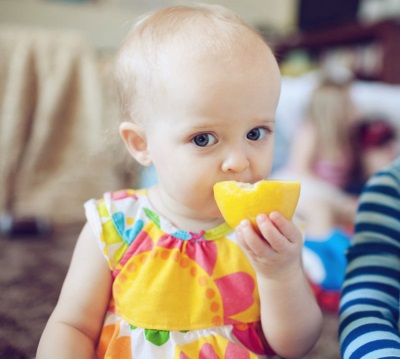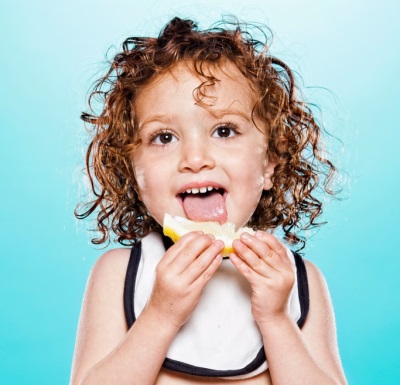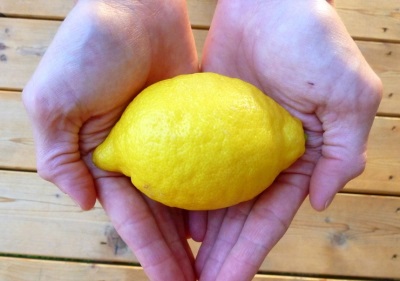How old and how to give children lemon?
When the baby starts to try new products, parents want to give the crumbs the most useful and vitamin-rich food. It is known that lemon is a rich source of vitamin C, but is it worth it to give this citrus fruit a try, at what age can this be done and what should you fear?
Benefit
Lemons, like other citrus fruits, contain a lot of vitamin C, and the juice from these fruits has antiseptic and antipyretic properties. Moderate consumption of lemon has such a positive effect:
- Improves digestion by eliminating dyspepsia, constipation or diarrhea.
- Disinfects the oral cavity.
- Has anthelmintic effect.
- Helps in the treatment of flu and colds.
- When added to drinks in the summer, it will help quench your thirst and refresh yourself in hot weather.
Lemons are especially useful for children with hypovitaminosis, acute viral infections, digestive problems.
Harm
- Although the color of lemons and not bright, yet these citrus fruits can become the cause of an allergic reaction.
- Due to the high content of organic acids, drinking lemon can have a bad effect on the mucous membranes of the baby's digestive tract. Lemon is contraindicated in gastritis, cholecystitis, enteritis, pancreatitis and other inflammatory diseases of the digestive tract.
- Also note the negative effects of lemon acid on the tooth enamel.
How many months can I put into the diet?
Start acquaintance with lemon crumbs should be no earlier than 8-10 months of age. It is possible to give both small pieces of a fruit, and citrus juice, diluting it with water with addition of sugar.
Having offered the baby to try a tiny slice of lemon for the first time, do not allow any new products in the next three days to be able to track the negative reaction to this fruit in time. If the baby has taken the citrus normally, you can continue to give the lemon in small pieces, but not daily.
Allergy-prone babies are not advised to give lemon at least until the age of two. Most pediatricians in the presence of allergic diseases in a child recommend to postpone the introduction of lemons in the diet until 5 years of age.
How to cook for a child of 1 year?
For feeding, lemon, unlike other fruits, is not frayed, but given in tiny pieces. The fruit should be thoroughly washed and cleaned of seeds.
Why is the baby not frowning?
Many children, trying a lemon at an early age (9-10 months), eat it absolutely calmly and do not frown. The reason for such a strange behavior for parents when eating lemon is the weak development of receptors in children's language. At this age, some babies do not yet fully feel the acid from a lemon wedge.
But mostly children feel sour taste. Laugh a little and see the reaction of the kids who try the lemon for the first time, you can in the next video.
Treatment
Lemon helps to cope with quite a lot of health problems:
- With vomiting caused by indigestion or nervous breakdown You can mix lemon juice (1/2 teaspoon) with natural honey (a teaspoon). This tool will remove the gagging urge.
- To lower the temperature, combine lemon juice (freshly squeezed) and honey, taking each ingredient in a tablespoon. Dilute them with 200 ml of warm water and let the child drink 3-4 times a day.
- If crumbs have tonsillitis, let's drink warm water with lemon. (1-2 glasses of spoons of fresh juice for a glass of water) and honey (a tablespoon). Also, when you have sore throat, it is good to eat fresh lemon and do regular rinsing with water and lemon (for 50 ml of water, take 25 ml of lemon juice).
- Recovery of water and electrolyte balance in diarrhea can be carried out using diluted lemon juice. In a glass of water, add a tablespoon of juice, a pinch of sugar and salt. Let's give this tool to the baby in small portions.
- To improve the appetite and get rid of bad breath, Every day they consume a teaspoon of the product, which is a mixture of grated lemon zest and honey.

Tips for choosing a quality lemon
For a small child who will try lemon for the first time, it is worth buying a fruit with a smooth skin of a pale yellow-orange hue. This fruit has a sweeter and delicate flavor, close to orange. If the skin of a lemon is smooth, but the color is bright yellow, then such a fruit will have a pronounced sour taste, which the crumb may not like.
On the peel of a lemon, you can judge the quality and ripeness of the fetus. In this case, you need to pay attention to the brilliance - if the lemon is not ripe, it will be a little dull, and the pronounced brilliance indicates that you already have ripe fruit in your hands.
When buying lemon crumbs, keep in mind that the tuberosity of the skin indicates that it is very thick. However, such lemons will be richer in beneficial substances, since the thick skin will reliably protect them inside the fruit.
When buying, be sure to click on the lemon and evaluate its elasticity. Ripe fruits will slightly spring, and softness indicates over-ripeness. If you have purchased an immature lemon, keep it in the fridge for a while, then it will retain its pleasant taste and valuable properties.
The presence of brown spots on lemons can be a sign of hypothermia fruit. These fruits usually have bitterness, so do not buy them for a child. If you have revealed the bitterness of a lemon already at home, just scald the fruit with boiling water.





























































